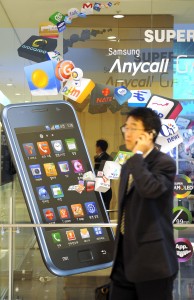During closing arguments, Apple attorney Harold McElhinny claimed Samsung was having a "crisis of design" after the 2007 launch of the iPhone, and executives with the South Korean company were determined to illegally cash in on the success of the revolutionary device.
Samsung's lawyers countered that it was simply and legally giving consumers what they want: Smart phones with big screens. They said Samsung didn't violate any of Apple's patents and further alleged innovations claimed by Apple were actually created by other companies.
Samsung has emerged as one of Apple's biggest rivals and has overtaken Apple as the leading smartphone maker.
Samsung's Galaxy line of phones run on Android, a mobile operating system that Google Inc. has given out for free to Samsung and other phone makers.
Samsung conceded that Apple makes great products but said it doesn't have a monopoly on the design of rectangle phones with rounded corners that it claimed it created.
The trial came after each side filed a blizzard of legal motions and refused advisories by U.S. District Judge Lucy Koh to settle the dispute out of court.
Deliberations by the jury of seven men and two women began Wednesday.
Samsung has sold 22.7 million smartphones and tablets that Apple claimed uses its technology. McElhinny said those devices accounted for $8.16 billion in sales since June 2010.
Apple and Samsung combined account for more than half of global smartphone sales.
As part of its lawsuit, Apple also demanded that Samsung pull its most popular cellphones and computer tablets from the U.S. market.
From the beginning, legal experts and Wall Street analysts viewed Samsung as the underdog in the case. Apple's headquarters is a mere 10 miles from the courthouse, and jurors were picked from the heart of Silicon Valley where Apple's late founder Steve Jobs is a revered technological pioneer.
While the legal and technological issues were complex, patent expert Alexander I. Poltorak previously said the case would likely boil down to whether jurors believe Samsung's products look and feel almost identical to Apple's iPhone and iPad.
To overcome that challenge at trial, Samsung's lawyers argued that many of Apple's claims of innovation were either obvious concepts or ideas stolen from Sony Corp. and others. Experts called that line of argument a high-risk strategy because of Apple's reputation as an innovator.
Apple's lawyers argued there is almost no difference between Samsung products and those of Apple, and presented internal Samsung documents they said showed it copied Apple designs. Samsung lawyers insisted that several other companies and inventors had previously developed much of the Apple technology at issue.
The U.S. trial is just the latest skirmish between the two tech giants over product designs. Previous legal battles were fought in Australia, the United Kingdom and Germany.
The U.S. case is one of some 50 lawsuits among myriad telecommunications companies jockeying for position in the burgeoning $219 billion market for smartphones and computer tablets.
Samsung won a home court ruling Friday in the global patent battle against Apple.
Judges in Seoul said Samsung didn't copy the look and feel of the iPhone and ruled that Apple infringed on Samsung's wireless technology.
However, the judges also said Samsung violated Apple's technology behind the feature that causes a screen to bounce back when a user scrolls to an end image. Both sides were ordered to pay limited damages.
Update: We spoke to David Bailey, a partner at the intellectual property law firm KPPB in Anaheim. Bailey said that it's possible the judge could increase the damages by up to a factor of three, to $3 billion, because the jury found Samsung's infringement was willful.
But Bailey also said that even that number would still be well within the ability of Samsung to absorb. He also said that Samsung is a critical supplier to Apple in the manufacturer of the iPhone, so "at the end of the day, these two companies need to be able to work together for Apple to continue producing its products," meaning there is considerable motivation for both companies to settle.
Furthermore, Bailey said, most of the Samsung products at issue are "very old products that are no longer being sold by Samsung anyway." Bailey said he thought many of the patent-infringing elements of those products had been eliminated in redesigns.
In light of all that, we asked him why this case was considered to be so important.
"The case is certainly high profile and has attracted a great deal of attention, I think because the iPhone has been such an iconic product that revolutionized the smartphone market," he said. "But the reality is, is that both companies are well beyond the life cycles of the products that are the subjects of these disputes. And an argument can be made that this case is not as important as its being made out in the media. It's more a validation of the level of innovation that Apple brought to bear on the creation of the first iPhone."
Update 2: Another opinion, from Mark Lemley, who teaches at Stanford Law School and specializes in intellectual property law. He says the verdict's real damage to Samsung will come if Judge Koh grants an injunction blocking sale of Samsung products that infringe on Apple patents.
